Quality of Palliative Care and Treatment Justification: Ivan Ilyich
VerifiedAdded on 2022/08/21
|5
|1378
|15
Essay
AI Summary
This essay delves into the palliative care provided to Ivan Ilyich in Leo Tolstoy's novella, 'The Death of Ivan Ilyich.' The assignment assesses the quality of care he received during his terminal illness, considering the context of 19th-century Russia and the limitations of available medical and emotional support. The essay examines the roles of various characters, particularly Gerasim, the butler, and Ivan's wife, in providing or failing to provide adequate care. It also explores the justification of the treatment Ivan received, considering his philosophical reflections on his life and suffering. The analysis references key sources, including the novella itself and academic articles on palliative care, to evaluate the effectiveness of the care provided and its impact on Ivan's final days. The essay concludes by summarizing the insights gained from the assessment of care and support offered to Ivan Ilyich and provides a comprehensive understanding of the concepts of palliative care in the given time frame.
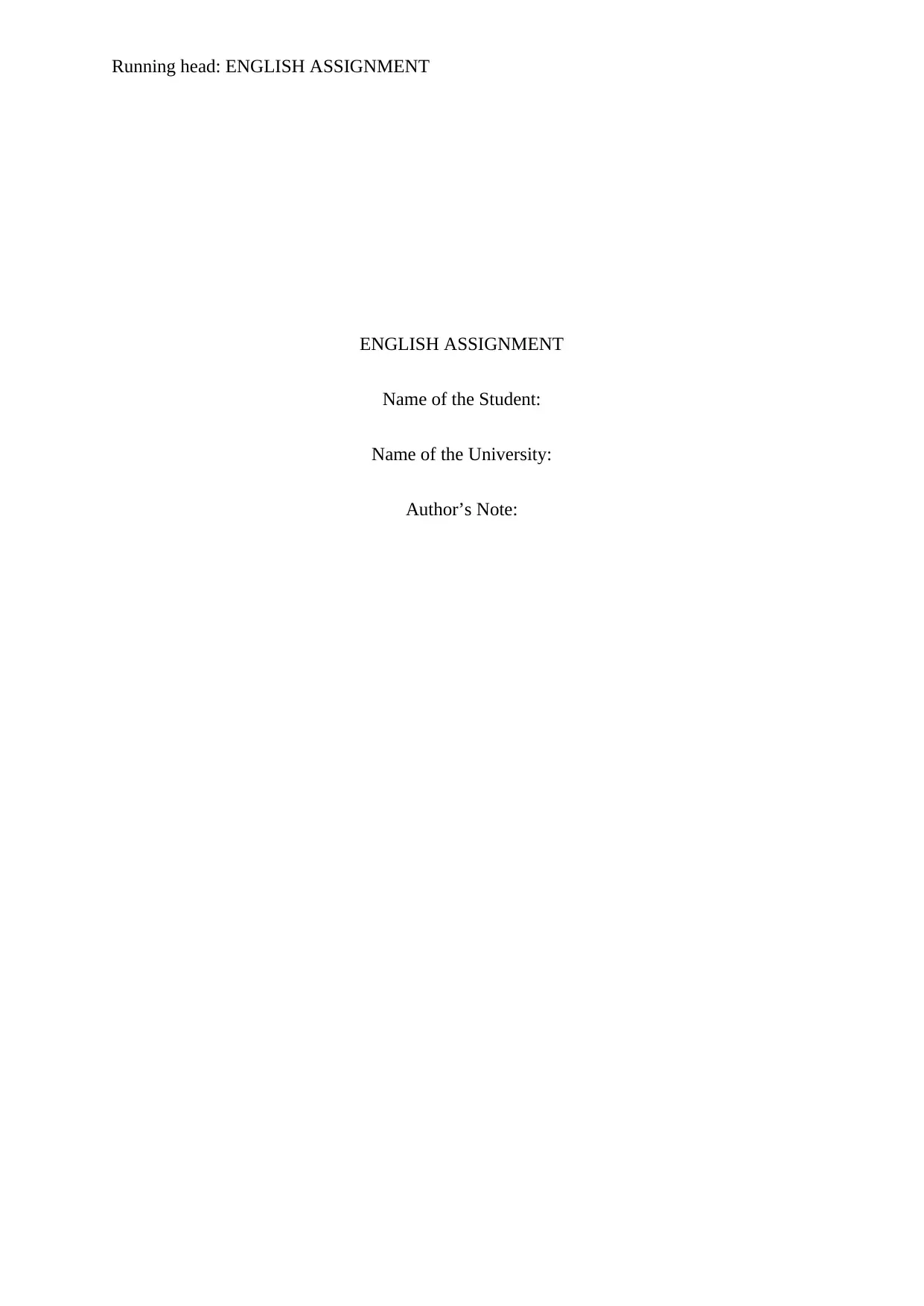
Running head: ENGLISH ASSIGNMENT
ENGLISH ASSIGNMENT
Name of the Student:
Name of the University:
Author’s Note:
ENGLISH ASSIGNMENT
Name of the Student:
Name of the University:
Author’s Note:
Paraphrase This Document
Need a fresh take? Get an instant paraphrase of this document with our AI Paraphraser
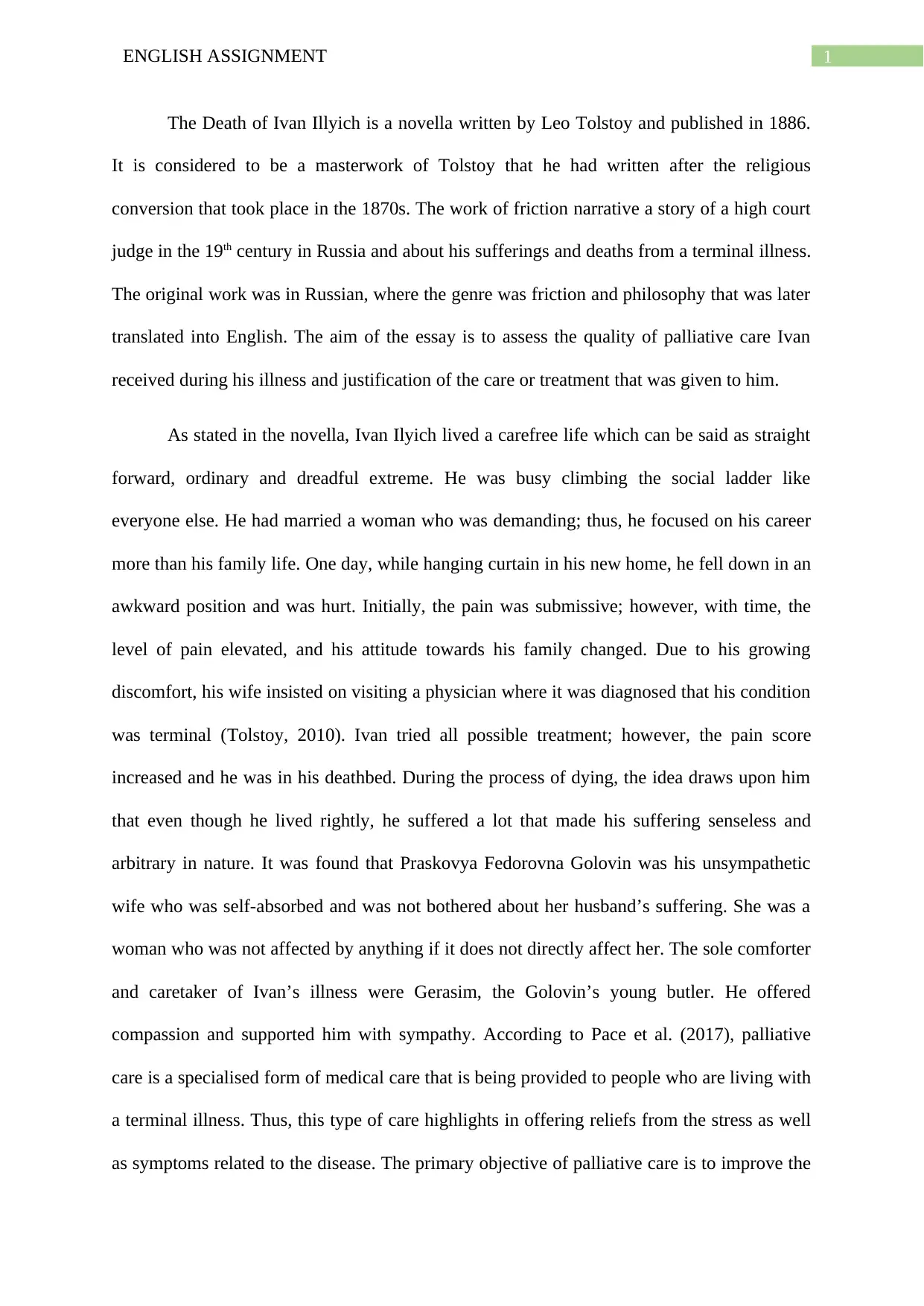
1ENGLISH ASSIGNMENT
The Death of Ivan Illyich is a novella written by Leo Tolstoy and published in 1886.
It is considered to be a masterwork of Tolstoy that he had written after the religious
conversion that took place in the 1870s. The work of friction narrative a story of a high court
judge in the 19th century in Russia and about his sufferings and deaths from a terminal illness.
The original work was in Russian, where the genre was friction and philosophy that was later
translated into English. The aim of the essay is to assess the quality of palliative care Ivan
received during his illness and justification of the care or treatment that was given to him.
As stated in the novella, Ivan Ilyich lived a carefree life which can be said as straight
forward, ordinary and dreadful extreme. He was busy climbing the social ladder like
everyone else. He had married a woman who was demanding; thus, he focused on his career
more than his family life. One day, while hanging curtain in his new home, he fell down in an
awkward position and was hurt. Initially, the pain was submissive; however, with time, the
level of pain elevated, and his attitude towards his family changed. Due to his growing
discomfort, his wife insisted on visiting a physician where it was diagnosed that his condition
was terminal (Tolstoy, 2010). Ivan tried all possible treatment; however, the pain score
increased and he was in his deathbed. During the process of dying, the idea draws upon him
that even though he lived rightly, he suffered a lot that made his suffering senseless and
arbitrary in nature. It was found that Praskovya Fedorovna Golovin was his unsympathetic
wife who was self-absorbed and was not bothered about her husband’s suffering. She was a
woman who was not affected by anything if it does not directly affect her. The sole comforter
and caretaker of Ivan’s illness were Gerasim, the Golovin’s young butler. He offered
compassion and supported him with sympathy. According to Pace et al. (2017), palliative
care is a specialised form of medical care that is being provided to people who are living with
a terminal illness. Thus, this type of care highlights in offering reliefs from the stress as well
as symptoms related to the disease. The primary objective of palliative care is to improve the
The Death of Ivan Illyich is a novella written by Leo Tolstoy and published in 1886.
It is considered to be a masterwork of Tolstoy that he had written after the religious
conversion that took place in the 1870s. The work of friction narrative a story of a high court
judge in the 19th century in Russia and about his sufferings and deaths from a terminal illness.
The original work was in Russian, where the genre was friction and philosophy that was later
translated into English. The aim of the essay is to assess the quality of palliative care Ivan
received during his illness and justification of the care or treatment that was given to him.
As stated in the novella, Ivan Ilyich lived a carefree life which can be said as straight
forward, ordinary and dreadful extreme. He was busy climbing the social ladder like
everyone else. He had married a woman who was demanding; thus, he focused on his career
more than his family life. One day, while hanging curtain in his new home, he fell down in an
awkward position and was hurt. Initially, the pain was submissive; however, with time, the
level of pain elevated, and his attitude towards his family changed. Due to his growing
discomfort, his wife insisted on visiting a physician where it was diagnosed that his condition
was terminal (Tolstoy, 2010). Ivan tried all possible treatment; however, the pain score
increased and he was in his deathbed. During the process of dying, the idea draws upon him
that even though he lived rightly, he suffered a lot that made his suffering senseless and
arbitrary in nature. It was found that Praskovya Fedorovna Golovin was his unsympathetic
wife who was self-absorbed and was not bothered about her husband’s suffering. She was a
woman who was not affected by anything if it does not directly affect her. The sole comforter
and caretaker of Ivan’s illness were Gerasim, the Golovin’s young butler. He offered
compassion and supported him with sympathy. According to Pace et al. (2017), palliative
care is a specialised form of medical care that is being provided to people who are living with
a terminal illness. Thus, this type of care highlights in offering reliefs from the stress as well
as symptoms related to the disease. The primary objective of palliative care is to improve the
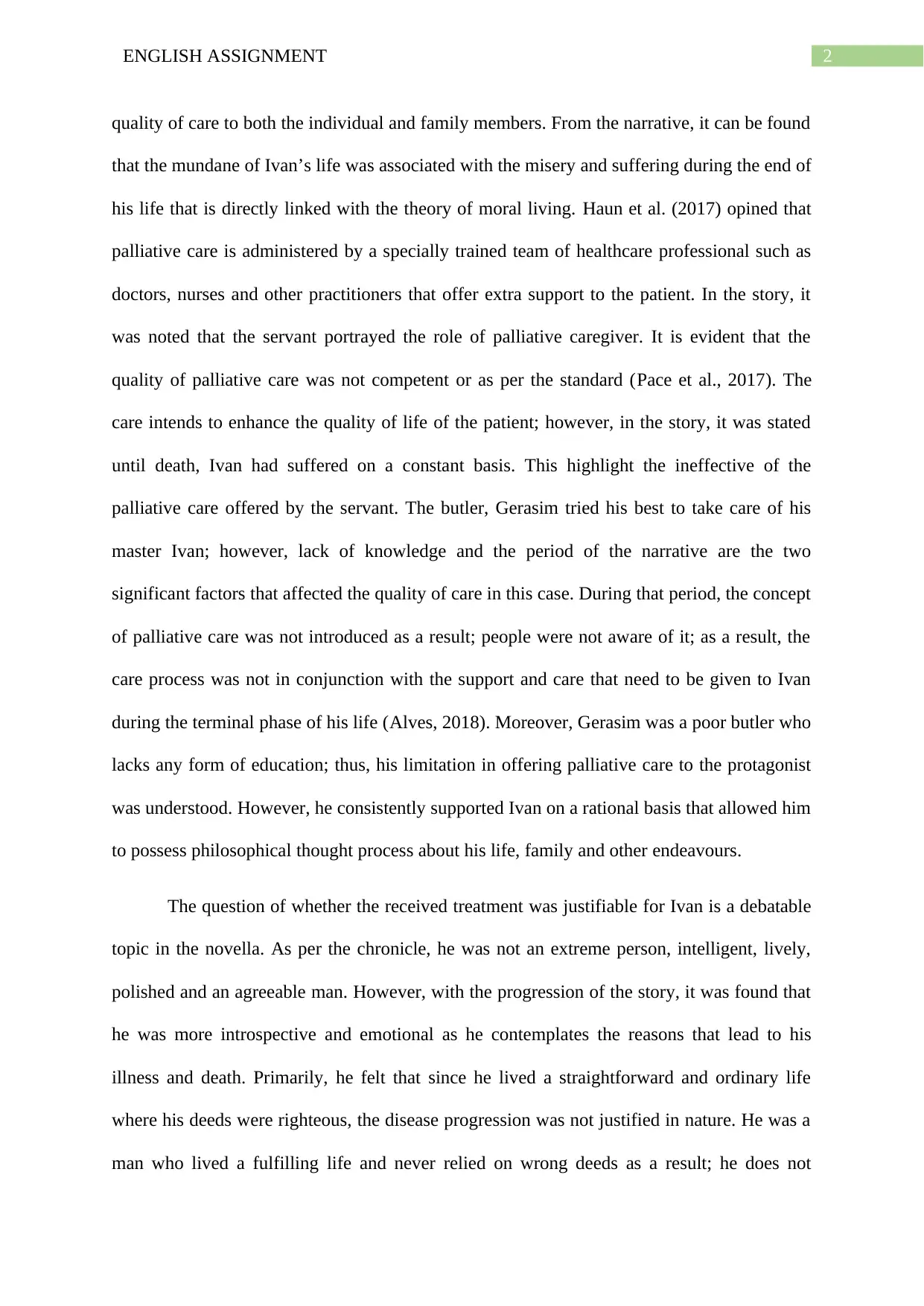
2ENGLISH ASSIGNMENT
quality of care to both the individual and family members. From the narrative, it can be found
that the mundane of Ivan’s life was associated with the misery and suffering during the end of
his life that is directly linked with the theory of moral living. Haun et al. (2017) opined that
palliative care is administered by a specially trained team of healthcare professional such as
doctors, nurses and other practitioners that offer extra support to the patient. In the story, it
was noted that the servant portrayed the role of palliative caregiver. It is evident that the
quality of palliative care was not competent or as per the standard (Pace et al., 2017). The
care intends to enhance the quality of life of the patient; however, in the story, it was stated
until death, Ivan had suffered on a constant basis. This highlight the ineffective of the
palliative care offered by the servant. The butler, Gerasim tried his best to take care of his
master Ivan; however, lack of knowledge and the period of the narrative are the two
significant factors that affected the quality of care in this case. During that period, the concept
of palliative care was not introduced as a result; people were not aware of it; as a result, the
care process was not in conjunction with the support and care that need to be given to Ivan
during the terminal phase of his life (Alves, 2018). Moreover, Gerasim was a poor butler who
lacks any form of education; thus, his limitation in offering palliative care to the protagonist
was understood. However, he consistently supported Ivan on a rational basis that allowed him
to possess philosophical thought process about his life, family and other endeavours.
The question of whether the received treatment was justifiable for Ivan is a debatable
topic in the novella. As per the chronicle, he was not an extreme person, intelligent, lively,
polished and an agreeable man. However, with the progression of the story, it was found that
he was more introspective and emotional as he contemplates the reasons that lead to his
illness and death. Primarily, he felt that since he lived a straightforward and ordinary life
where his deeds were righteous, the disease progression was not justified in nature. He was a
man who lived a fulfilling life and never relied on wrong deeds as a result; he does not
quality of care to both the individual and family members. From the narrative, it can be found
that the mundane of Ivan’s life was associated with the misery and suffering during the end of
his life that is directly linked with the theory of moral living. Haun et al. (2017) opined that
palliative care is administered by a specially trained team of healthcare professional such as
doctors, nurses and other practitioners that offer extra support to the patient. In the story, it
was noted that the servant portrayed the role of palliative caregiver. It is evident that the
quality of palliative care was not competent or as per the standard (Pace et al., 2017). The
care intends to enhance the quality of life of the patient; however, in the story, it was stated
until death, Ivan had suffered on a constant basis. This highlight the ineffective of the
palliative care offered by the servant. The butler, Gerasim tried his best to take care of his
master Ivan; however, lack of knowledge and the period of the narrative are the two
significant factors that affected the quality of care in this case. During that period, the concept
of palliative care was not introduced as a result; people were not aware of it; as a result, the
care process was not in conjunction with the support and care that need to be given to Ivan
during the terminal phase of his life (Alves, 2018). Moreover, Gerasim was a poor butler who
lacks any form of education; thus, his limitation in offering palliative care to the protagonist
was understood. However, he consistently supported Ivan on a rational basis that allowed him
to possess philosophical thought process about his life, family and other endeavours.
The question of whether the received treatment was justifiable for Ivan is a debatable
topic in the novella. As per the chronicle, he was not an extreme person, intelligent, lively,
polished and an agreeable man. However, with the progression of the story, it was found that
he was more introspective and emotional as he contemplates the reasons that lead to his
illness and death. Primarily, he felt that since he lived a straightforward and ordinary life
where his deeds were righteous, the disease progression was not justified in nature. He was a
man who lived a fulfilling life and never relied on wrong deeds as a result; he does not
⊘ This is a preview!⊘
Do you want full access?
Subscribe today to unlock all pages.

Trusted by 1+ million students worldwide
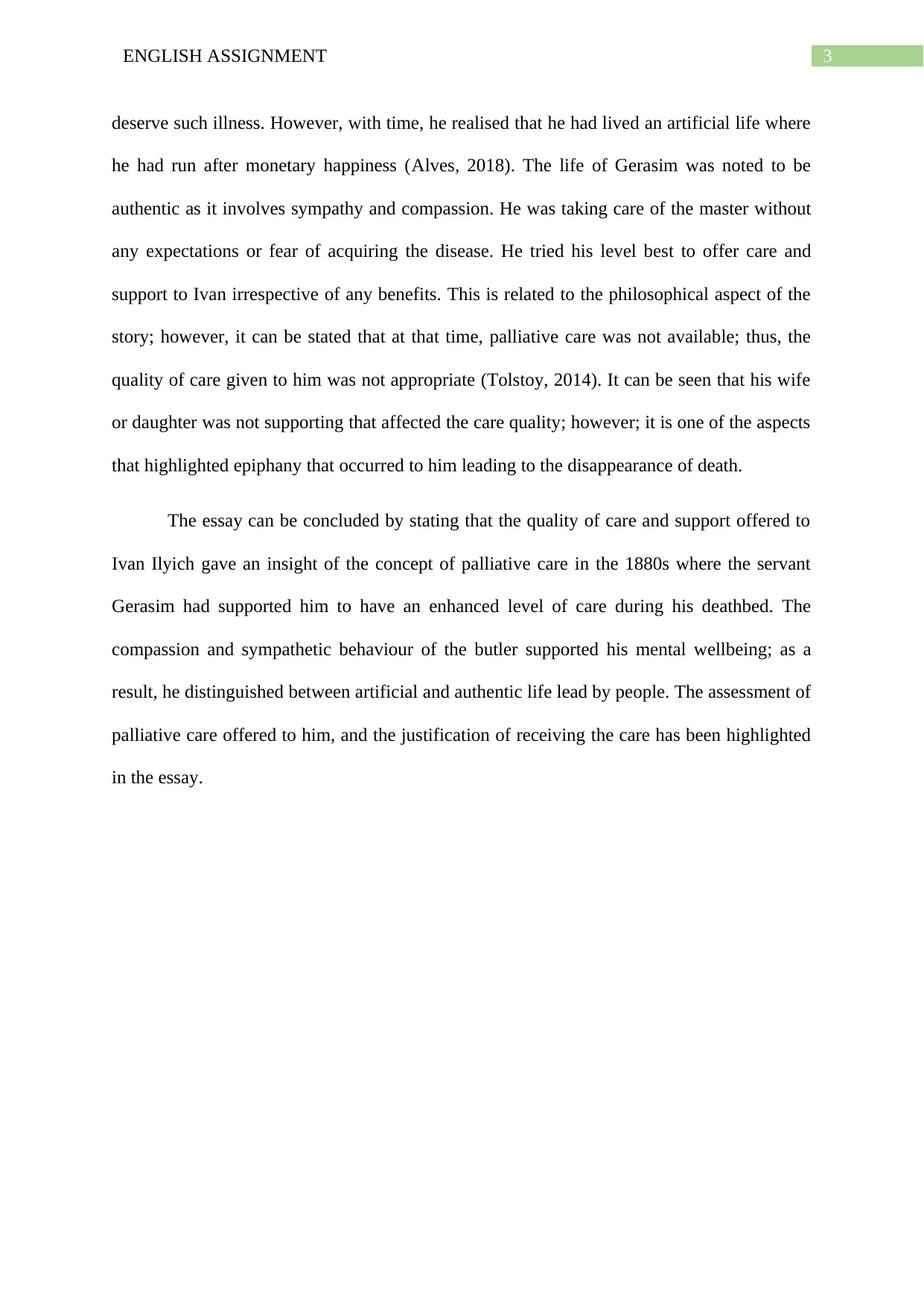
3ENGLISH ASSIGNMENT
deserve such illness. However, with time, he realised that he had lived an artificial life where
he had run after monetary happiness (Alves, 2018). The life of Gerasim was noted to be
authentic as it involves sympathy and compassion. He was taking care of the master without
any expectations or fear of acquiring the disease. He tried his level best to offer care and
support to Ivan irrespective of any benefits. This is related to the philosophical aspect of the
story; however, it can be stated that at that time, palliative care was not available; thus, the
quality of care given to him was not appropriate (Tolstoy, 2014). It can be seen that his wife
or daughter was not supporting that affected the care quality; however; it is one of the aspects
that highlighted epiphany that occurred to him leading to the disappearance of death.
The essay can be concluded by stating that the quality of care and support offered to
Ivan Ilyich gave an insight of the concept of palliative care in the 1880s where the servant
Gerasim had supported him to have an enhanced level of care during his deathbed. The
compassion and sympathetic behaviour of the butler supported his mental wellbeing; as a
result, he distinguished between artificial and authentic life lead by people. The assessment of
palliative care offered to him, and the justification of receiving the care has been highlighted
in the essay.
deserve such illness. However, with time, he realised that he had lived an artificial life where
he had run after monetary happiness (Alves, 2018). The life of Gerasim was noted to be
authentic as it involves sympathy and compassion. He was taking care of the master without
any expectations or fear of acquiring the disease. He tried his level best to offer care and
support to Ivan irrespective of any benefits. This is related to the philosophical aspect of the
story; however, it can be stated that at that time, palliative care was not available; thus, the
quality of care given to him was not appropriate (Tolstoy, 2014). It can be seen that his wife
or daughter was not supporting that affected the care quality; however; it is one of the aspects
that highlighted epiphany that occurred to him leading to the disappearance of death.
The essay can be concluded by stating that the quality of care and support offered to
Ivan Ilyich gave an insight of the concept of palliative care in the 1880s where the servant
Gerasim had supported him to have an enhanced level of care during his deathbed. The
compassion and sympathetic behaviour of the butler supported his mental wellbeing; as a
result, he distinguished between artificial and authentic life lead by people. The assessment of
palliative care offered to him, and the justification of receiving the care has been highlighted
in the essay.
Paraphrase This Document
Need a fresh take? Get an instant paraphrase of this document with our AI Paraphraser
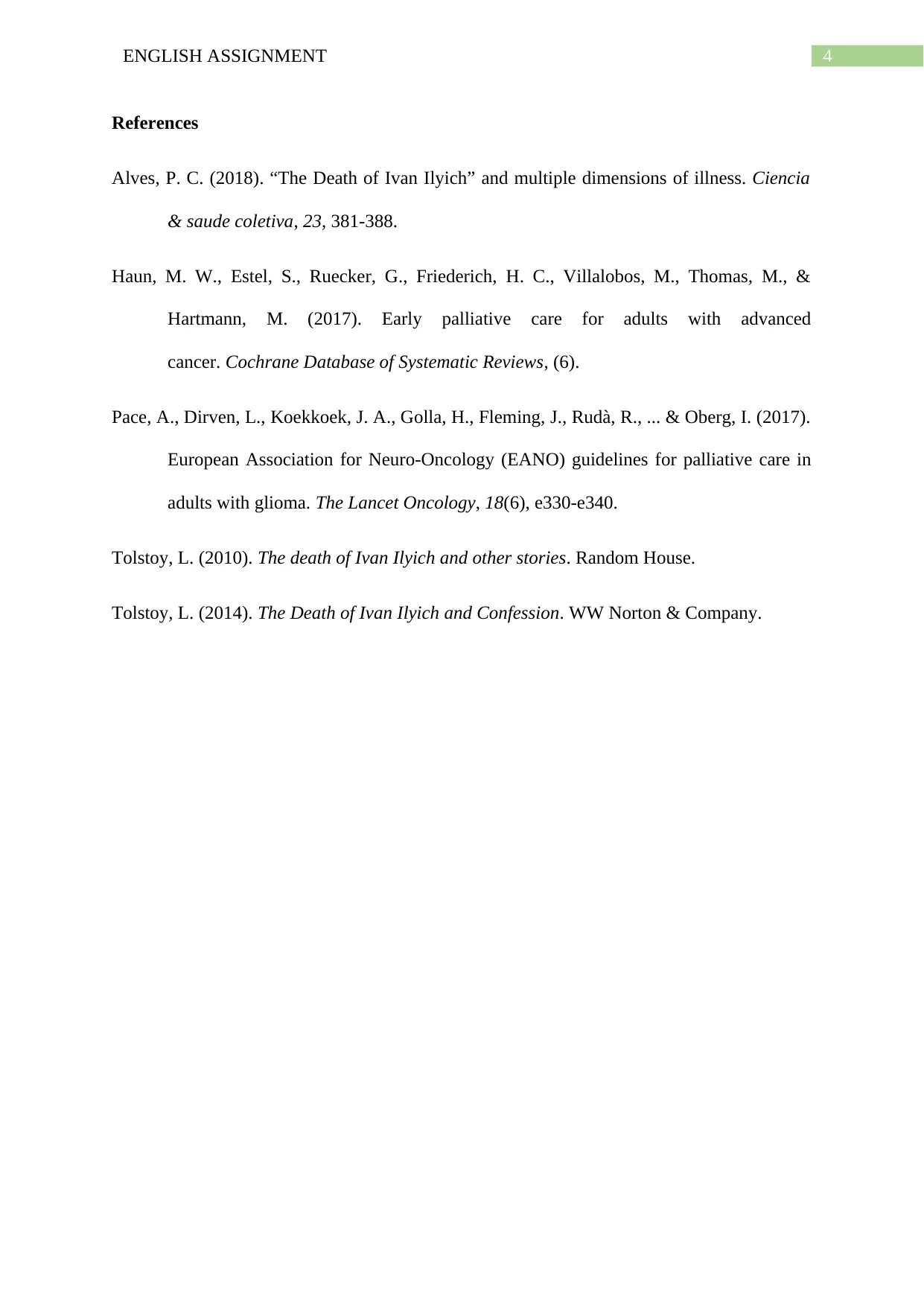
4ENGLISH ASSIGNMENT
References
Alves, P. C. (2018). “The Death of Ivan Ilyich” and multiple dimensions of illness. Ciencia
& saude coletiva, 23, 381-388.
Haun, M. W., Estel, S., Ruecker, G., Friederich, H. C., Villalobos, M., Thomas, M., &
Hartmann, M. (2017). Early palliative care for adults with advanced
cancer. Cochrane Database of Systematic Reviews, (6).
Pace, A., Dirven, L., Koekkoek, J. A., Golla, H., Fleming, J., Rudà, R., ... & Oberg, I. (2017).
European Association for Neuro-Oncology (EANO) guidelines for palliative care in
adults with glioma. The Lancet Oncology, 18(6), e330-e340.
Tolstoy, L. (2010). The death of Ivan Ilyich and other stories. Random House.
Tolstoy, L. (2014). The Death of Ivan Ilyich and Confession. WW Norton & Company.
References
Alves, P. C. (2018). “The Death of Ivan Ilyich” and multiple dimensions of illness. Ciencia
& saude coletiva, 23, 381-388.
Haun, M. W., Estel, S., Ruecker, G., Friederich, H. C., Villalobos, M., Thomas, M., &
Hartmann, M. (2017). Early palliative care for adults with advanced
cancer. Cochrane Database of Systematic Reviews, (6).
Pace, A., Dirven, L., Koekkoek, J. A., Golla, H., Fleming, J., Rudà, R., ... & Oberg, I. (2017).
European Association for Neuro-Oncology (EANO) guidelines for palliative care in
adults with glioma. The Lancet Oncology, 18(6), e330-e340.
Tolstoy, L. (2010). The death of Ivan Ilyich and other stories. Random House.
Tolstoy, L. (2014). The Death of Ivan Ilyich and Confession. WW Norton & Company.
1 out of 5
Related Documents
Your All-in-One AI-Powered Toolkit for Academic Success.
+13062052269
info@desklib.com
Available 24*7 on WhatsApp / Email
![[object Object]](/_next/static/media/star-bottom.7253800d.svg)
Unlock your academic potential
Copyright © 2020–2026 A2Z Services. All Rights Reserved. Developed and managed by ZUCOL.




